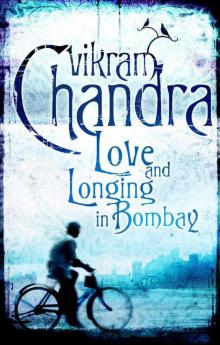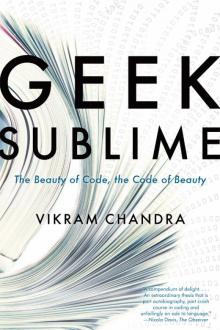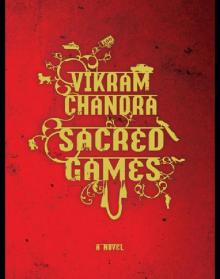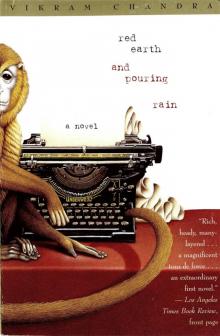- Home
- Vikram Chandra
Red Earth and Pouring Rain
Red Earth and Pouring Rain Read online
international acclaim for
RED EARTH AND POURING RAIN
“In a word, this debut novel is a marvel.”
—Long Island Newsday
“Red Earth and Pouring Rain has passages of epic grandeur and desolation worthy of Thomas Mallory…. Chandra is imagining and writing with such originality and intensity as to be not merely drawing on myth but making it. His imagination is visionary.”
—The Sunday Times (London)
“Wonderfully told, with vividly atmospheric descriptions, appealing minor characters, and interesting insights into the history and culture of colonial India. Vikram Chandra’s considerable gifts as a stylist shine here.”
—Philadelphia Inquirer
“One of the most accomplished and rewarding novels of recent memory.”
—Houston Chronicle
“Richly textured and engrossing.”
—Kirkus Reviews
“Chandra has constructed a brilliantly conceived story line, and this book certainly will help classify him as a premier teller of tales. The language used by the young author is mesmerizing.”
—Denver Post
“In Chandra’s skillful hands this is an engrossing novel…. Time spent here will be all pleasure.”
—Seattle Times
“Memorable and astonishing.”
—The Literary Review (London)
“Red Earth and Pouring Rain is an important story… in its breadth and scope, theme and style. For those readers open to experiencing the blurring and complexity of the twice-told and twice-felt, this is a vastly gratifying work.”
—Portland Oregonian
“A dazzling multiplicity of stories… it is the story of more than one nation and century; caught up in its fantastical branches and glowing imagery are delicate and affecting portraits. Metaphor and prose are melded together with a hypnotic quality”
—The Independent (London)
“This is an exceptional novel…. An astonishing debut.”
—India Currents Magazine
“Magical realism with an Asian-American twist.”
—Library Journal
“Vikram Chandra’s Red Earth and Pouring Rain is, quite simply, good fiction, pure enjoyment.”
—Virginian-Pilot and Ledger-Star
“There is much to admire and applaud in this novel —its playful but always intelligent command of its diverse materials; its implicit creation of contrasts between different civilizations and epochs; its ability to create a world in which gods, monkeys, Indians, and Englishmen coexist; and the sheer onward movement of its story, or stories.”
—Times Literary Supplement (London)
Also by Vikram Chandra
LOVE AND LONGING IN BOMBAY
Copyright
Copyright © 1995 by Vikram Chandra
All rights reserved. Except as permitted under the U.S. Copyright
Act of 1976, no part of this publication may be reproduced,
distributed, or transmitted in any form or by any means,
or stored in a database or retrieval system, without the
prior written permission of the publisher.
Back Bay Books / Little, Brown and Company
Warner Books, Inc.
Hachette Book Group
237 Park Avenue
New York, NY 10017
Visit our website at www.HachetteBookGroup.com
www.twitter.com/littlebrown
First eBook Edition: November 2009
The characters and events in this book are fictitious.
Any similarity to real persons, living or dead,
is coincidental and not intended by the author.
ISBN: 978-0-316-09286-9
For my father and mother,
Navin and Kamna
Contents
Also by Vikram Chandra
Copyright
Acknowledgments
...before.
The Book of War and Ancestors
...now...
The Strange Passion of Benoit de Boigne.
...now...
A Thin Kind of Happiness.
...now...
George Thomas Goes Overboard.
...now...
What Really Happened.
...now...
Ram Mohan Ties a Knot, and Sikander Is Born.
The Book of Learning and Desolation
...now...
What We Learned at School.
...now...
Janvi Defends Her Honour.
The Book of Bloodand Journeys
...now...
What Really Happened.
...now...
Sanjay Eats His Words.
The Book of Revenge and Madness
...now...
Sex and the Judge.
...now...
Sikander Learns the Art of War.
The Book of the Return
...now...
What Really Happened.
...now...
In London, a Battle Between Immortals.
...now...
The Game of Cricket.
After...
Praise for Vikram Chandra’s
Acknowledgments
FOR KIND WORDS, help, and inspiration, my thanks to Yogi Jain; Gilbert Bose; Roshna and Sudha Kapadia; Robert Mezey; Martha Andresen; Steve Erickson; Brad Dourif; Wendy James, friend and patron of the arts; John Barth; Donald Barthelme; Lynn Nesbit; Eric Simonoff; Alexis Quinlan; David Harvey; Amy Storrow; Leslie Richardson; David Davidar; Nicholas Pearson; Jordan Pavlin; Margo True, who made it possible, for whom each page was written; and my sisters, Tanuja and Anupama.
before.
THE DAY before Abhay shot the white-faced monkey, he awoke to find himself bathed in sweat, a headache already cutting its way into his skull in a razor-thin line across the middle of his forehead. He lay staring at the slowly-revolving ceiling fan that picked up dust with each revolution through the hot air, adding another layer to the black stains along the edges of its blades. Much later, he rose from the bed and stumbled to the door, rubbing his face with the flat of his palms. As he looked out at the sunlit court-yard with the slightly-dazed eyes of those who go away laughingly on journeys and return only to find themselves coming home from exile, his mother swayed across the red bricks, carrying a load of freshly-washed clothes on one hip, and vanished into the stairway leading up to the roof. In a room diagonally across the court-yard from where Abhay stood, his father’s ancient typewriter beat out its eternal thik-thik, creating yet another urgent missive to a national newspaper about the state of democracy in India. A single crow cawed incessantly. Abhay forced himself out into the white, blinding square of heat, feeling the sun sear across the back of his neck, and hurried across it to the damp darkness of the bathroom. He stripped off his clothes and stood under the rusted shower head, twisting at knobs, waiting expectantly. A deep, subterranean gurgle shook the pipes, the shower head spat out a few tepid drops, and then there was silence.
‘Abhay, is that you? The water stops at ten. Come and eat.’
When he emerged from the bathroom, having splashed water over his arms and his face from a bucket, his mother had breakfast laid out on the table next to the kitchen door, and his father was peering at an opened newspaper through steel-rimmed bifocals.
‘We could still win the Test if Parikh bats well tomorrow,’ said Mr Misra sagely, ‘but he’s been known to give out under pressure.’
‘Who’s Parikh?’ Abhay said. He could see, in a head-line on the front page of the newspaper, the words ‘terror threat.’
‘One of the best of the new chaps. Haven’t been keeping up with cricket much, have you?’
‘They don’t have mu
ch about it in the American press,’ Abhay said. ‘When does the water come back on?’
‘Three-thirty’ said his mother as she emerged from the kitchen bearing hot parathas. ‘I thought of waking you up, but you looked so tired last night.’
‘Jet lag, Ma. It’ll take a week or two to go away.’
‘Maybe,’ Mr Misra said, folding his newspaper. Abhay looked up, surprised at the sudden quietness in his father’s voice, wondering how much change his father recognized in his eyes, in the way he carried himself. A quick movement on the roof caught his eye, and he craned his neck.
‘It’s that white-faced monkey!’ he burst out. ‘He’s still here.’
‘Oh, yes,’ said Mr Misra. ‘He’s a member of the family now. Mrinalini feeds him every morning.’
The monkey hopped onto the roof from the branches of the peepul tree at the front of the house, loped up to the laundry line and, with a sweep of its arms, gathered up a sari, a shirt and two pieces of underwear, and raced back to the tree. It waited, firmly seated in the spreading branches, as Mrs Misra went up the stairs and laid two parathas on the wall that ran around the edge of the roof and stepped back some four or five paces. The monkey, moving with assurance, as one moves during the performance of a familiar ritual, swung back to the roof, dropped the clothes, seized the parathas, and clambered back into its familiar leafy territory, where, after it had seated itself comfortably on a suitable branch, it proceeded to eat the bread, cocking its head occasionally to watch Mrs Misra as she gathered up the clothes and put them back on the line.
‘It’s still terrorizing you after all these years,’ said Abhay. ‘You should do something about it.’
‘It’s just trying to make a living, like the rest of us,’ Mr Misra said, ‘and it’s getting old. He’s moving pretty slowly now, did you see? Forget him. Eat, eat.’
Abhay bent his head back to his meal, but straightened up every now and then to peer at the peepul tree, where the monkey was intently devouring its daily bread. Somehow, even as he savoured the strangely unfamiliar flavours of his mother’s cooking, Abhay was unable to shake the conviction that the animal, secure in the cool shade of the peepul tree, was enjoying its meal more than he was, and that there was some secret irony, some occult meaning in their unwitting sharing of food. The monkey finished first and sat with its head cocked to the right, peering intently at the family below, a puzzled look on its face. It scratched at an armpit, turned and swung itself deeper into the recesses of the peepul, stopped and peered at the sparkling white house with its little square court-yard, and then abruptly slung itself away into the trees on the adjoining maidan.
That afternoon, in the course of his meanderings over the roof-tops of the city, the monkey found himself in a tree on the maidan again. More out of habit than from hunger, he negotiated his way to the peepul and vaulted onto the roof. Below, Abhay was seated at the kitchen table, sipping from a glass of cool nimbu pani, speaking haltingly and somewhat formally to his parents about his travels and times in a foreign land. As the monkey began his customary gathering of garments, he was surprised to see Abhay jump out of his chair and dash up the stairs to the roof. Moving as fast as his ageing limbs would permit, the monkey propelled himself off the roof and onto a branch, clutching just one piece of apparel. A moment later, a nasal howl of pain burst from his lips as a jagged piece of brick shattered into smaller fragments against his rump. Pausing only to bare his yellowed fangs in the general direction of the roof-top, the aged monkey disappeared into the trees on the other side of the expanse of open ground in front of the house.
‘He got my jeans,’ Abhay said. The son of a bitch has my jeans.’
‘Well, what did you expect?’ Mrs Misra said, a little stiffly, irritated by the sudden violence inflicted on a member of the tribe of Hanuman. ‘You scared him away.’
‘Will he bring them back? Cost forty dollars.’
‘No, he’ll probably drop them somewhere and forget all about it. You’ve lost those pants.’
She walked away, into her bedroom. As Abhay descended from the roof, suddenly aware of the perspiration streaming down his sides and his mother’s displeasure, he felt an old adolescent anger awaken, sensed an old bitterness tinged with resentment and frustration leaping up again, ancient quarrels and terrors and reasons for leaving raising their heads, unquiet, undead, effortlessly resurrected.
When the trees extended serrated shadows across the maidan, under a few gaily-coloured kites that hung almost motionless in the air, tiny bits of red, green, yellow and orange against a vast blue, Abhay walked in a huge circle, over the tufts of grass and through the teams of barefoot boys engaged in interminable games of cricket. To the south, in the crowded lanes and bazaars of Janakpur, his past waited, eager to confront him with old friends and half-forgotten sounds and smells. But Abhay hesitated, nagged by a feeling that he had been away for several centuries, not four years, afraid of what he might find lurking in the shadows of bygone days, and suddenly he felt his soul drop away, felt it withdrawing, leaving him cold and abstracted. So he watched himself, as if from a great height, watched himself describe two great circles and then trudge back into the white house. In the same dream-like state, he watched himself converse with his parents and eat dinner. Much later, he calmly observed himself scrabbling in the recesses of a cupboard, throwing aside yellowed comic books and once-cherished novels, to emerge, then, finally, bearing a child’s weapon, a child’s toy, this: a rifle, bolt-action, calibre 0.22, a miniature weapon, yet sleek and deadly. Hands caress it, linger over its contours, feel the smooth blue-black steel, hands trace the lines of the heavy wood and test the action, snick-CLACK, these hands that belong to someone not familiar to the members of the Misra household, these hands that feed the slim golden rounds into the magazine, click-click-click, these hands belong to a stranger. This stranger sits in a chair next to a window, cradling the rifle, watching the roof. Far away, on the edge of wilderness, a jackal howls, and the dogs from the city retort, but there is no indication that the figure by the window hears any of this.
The monkey, propped securely in a fork high up on a banyan tree, was awakened by the first rays of the sun spreading warmth across his back and a sudden emptiness in the pit of his stomach. He recalled, fuzzily, having been hungry when the sun last set, but the encounter with the fragment of brick had already begun to fade into the undifferentiated grey mist that constituted his past. Ravenous, the monkey skimmed across the tree-tops and roof-tops of the city, to the white house at the edge of the maidan, where a substantial meal could usually be negotiated without too much trouble. The house, the top of its walls beginning to glow a rich pink, was silent, and the laundry line was bare. The monkey wandered disconsolately across the roof, pausing to sniff at the crumpled remnants of a kite. He squatted at the edge of the roof, above the court-yard, feeling faintly, tantalizingly, the lingering odours of cooking float up from the kitchen. Restless, he moves, and is momentarily silhouetted against the pink-white wall where the staircase emerges onto the roof, and then, abruptly, a thin line of white light blossoms from a dark window, and the monkey feels an impact against his chest, under his right shoulder, an instant before he hears the flat WHAP, before he registers, with a baring of fangs and an amazed growl, that something very bad has happened; he feels himself being spun around, sees suddenly the red sun, the pink-white wall splattered with red; the world spins and breaks into fragments, red and white, red and white, another wall a glowing yellow, staggering to the side, the edge, slipping and stumbling, a slow slide, a desperate grab at the edge of the roof, but already strength and balance are gone, and the monkey drops, turning, and in the drop, within the space of that turn, a wholly unfamiliar image, a completely un-monkey-like scene flashes into its mind, red and white, red and white, glowing yellow, three thousand lances, the thunder of hooves, and then the monkey hits the red brick with a thick thump, to lie silently at the edge of the court-yard.
Abhay walked out to the still lump
of flesh and fur, carrying the rifle, and stood over it, staring down, blinking, at the neat round hole drilled into the fur, just beginning to fill with blood. A moment later, his parents burst out of the dark recesses of the house, rubbing their eyes.
‘Abhay, what have you done?’ Mrs Misra said.
‘Abhay, you know there is a Hanuman temple not five minutes from here; if they find out they’ll start a riot!’
‘Is it still alive?’
‘Yes, I think so; help me get it inside.’
Abhay watched, his pulse suddenly vibrating and strumming hoarsely in his ears, as his parents picked up the limp animal and carried it into his father’s study. His mother came out, then hurried back past him, carrying a pot of steaming water, her eyes reproachfully averted, but he stood, paralysed, the stock of the rifle hard and heavy in his hand, staring with unbelieving, stunned eyes at the stains on the ground, red on red.
For nine days and nine nights the monkey lay unconscious, its chest swathed in cotton, eyes closed, while Mrs Misra held handkerchiefs soaked in milk to its lips, and Mr Misra paced up and down, hands clasped behind his back. The door to the room was kept closed to prevent visitors from catching a glimpse of the wounded monkey, but often Abhay stood outside the room, a puzzled look on his face, moving his head back and forth. On the ninth day the monkey opened his eyes and gazed uncomprehendingly at the ceiling. The Misras recoiled, a little frightened, but the monkey didn’t seem to notice them. It lay, eyes glazed, lost in an internal fog in which pieces of a life long gone drifted together, images colliding and melding to form a self, a ragged, patchwork nothing, a dream, a person named Parasher. I know. I am he. I. I am the monkey. I am that diaphanous mechanism once encased in human flesh and known as Parasher, or Sanjay. I am he, come back from the phantasmagorical regions of death and the mists of animal unknowing.
I felt my soul settling into a shape, a form. Each day I remembered more, and each day I grew more conscious. At first, as I lay paralysed, I could barely see the man and woman who kept me alive. When my sight cleared, I saw that they were dressed in garb I could not put a name to but which seemed strangely familiar. There was a look of wariness on their faces that I could not quite understand, and I strained my throat to tell them that I was Sanjay, born of a good Brahmin family. I could, however, emit only sudden growls from the back of my throat, which caused them to retreat in fear. Then, you see, in my delirium and shock, I imagined I was still swathed in the human body I knew so well, with its two scars on the forehead, its flowing white hair and the missing finger on the left hand. So, I lay limp, seeing pictures coalesce in the motes of dust above my head, and I saw a face appear again and again, a broad, kindly face with sad eyes and a resolute jaw, greying whiskers, oh, my Sikander, those sad, sad eyes —I saw this and other things, tumbled together and indistinct. On the sixteenth day I found I could move my left arm. Slowly, straining, I raised my hand away from the soft cloth it had been resting on; slowly, my heart pounding —I believe I knew before I ever saw the fur and the brown-yellow flesh —I brought it up, closer to my immobile head until I could see it, and then my blood ran cold. In that instant, I remembered the last awful moments, I remembered my death, that terrible walk through the rain, and the dark figure that walked beside me. In that instant I knew what I had done and what had happened, what I had become. I brought the hand close to my eyes and looked at it, noting, in a wildly detached manner, the cracked skin of the palms, the matted fur and the small black fingernails. I ran my hand over the contours of my face, feeling the fur along the cheek-bones and the jutting jaw, the quickly receding forehead and the jagged teeth. Gathering all my strength, I raised my head and glanced around the room, seeing first a little ivory statuette on a table, a delicately sculptured chariot drawn by six horses, bearing a warrior and a driver under the banner of Hanuman, and seeing that familiar image I was momentarily relieved, but then I saw the rest of the room, the shelves brimming with books and the strange white sheen of the impossibly fast punkah that rotated overhead, the equally strange pictures on the wall, and I knew then that I was immeasurably far from home. Terrified, I tried to get up, scrabbling weakly at the sheets, whimpering. Somehow, I managed to turn my body; I felt myself drop and hit a hard, cool floor. Dimly, I sensed hands picking me up. My vision constricted, and I hurtled down a long, dark tunnel, and then, once again —darkness.

 Love and Longing in Bombay
Love and Longing in Bombay Geek Sublime
Geek Sublime Sacred Games
Sacred Games Red Earth and Pouring Rain
Red Earth and Pouring Rain